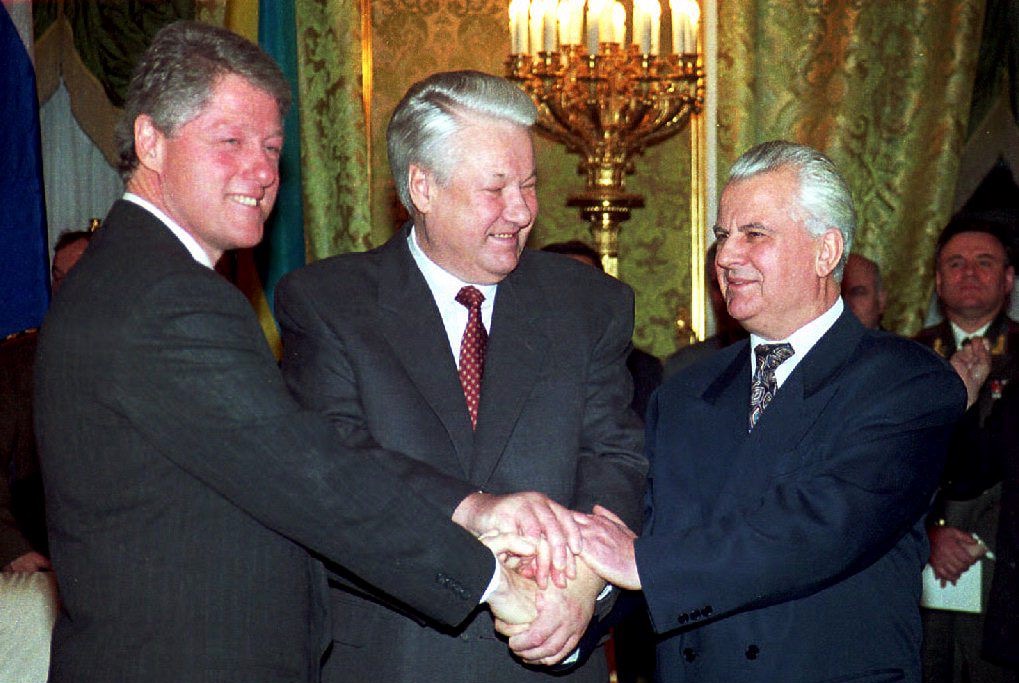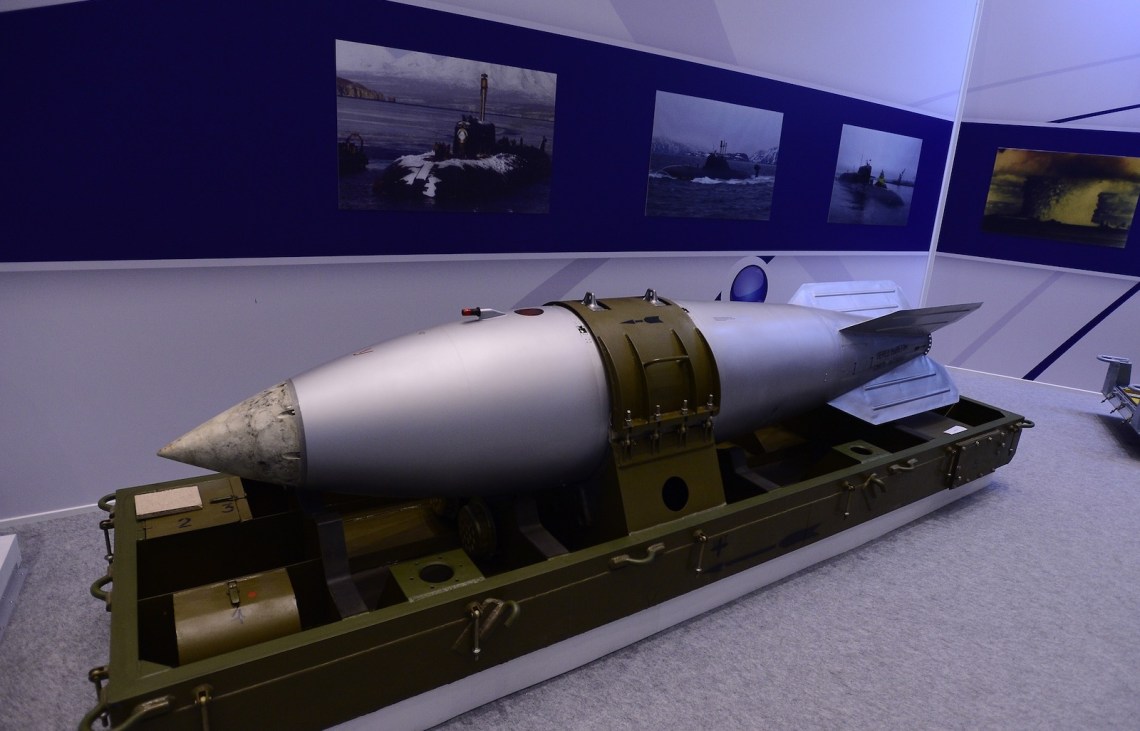As Russian tanks rolled on their way to encircle Kyiv, and Russian bombs and rockets drove Ukrainians toward their borders as refugees, a familiar sense of helplessness spread in the West. We can assist those who flee. And we can hit Moscow with sanctions and exclusions. But as was the case with Hungary in 1956 and Czechoslovakia in 1968, we cannot intervene directly to help. We cannot deploy NATO’s vastly superior air force to close the skies over Ukraine and save the thousands of Ukrainians who will otherwise die as a result of Russia’s war of aggression. We in the West cannot send our troops to fight alongside the heroic defenders of Kyiv, Kharkiv, and Dnipro.
The reason for this deadly incapacity is Russia’s array of strategic nuclear weaponry, a total of around six thousand warheads, the world’s largest atomic arsenal. Targeted at Europe and North America, these weapons have enabled Vladimir Putin’s war. He believes, probably rightly, that the Russian nuclear threat will prevent the West from sending its forces to Ukraine’s rescue. Putin also judges that atomic saber-rattling will make it easier for him to achieve his war aims, with a barely veiled threat warning the Ukrainian people that their country, as a non-nuclear power, cannot prevail against Russia.
Besides reviving the significance of nuclear threats in international affairs in the most blatant way possible, the current crisis also reminds us how little thought and attention have gone into the problem of atomic weapons and arms control since the end of the cold war. In the 1990s, after the collapse of the USSR, the Western alliance had its best-ever opportunity to sharply reduce nuclear arsenals, possibly to the point of abolishing whole classes of such weapons.
Certainly, this would not have been easy to accomplish. A Russia in steep decline had much of its remaining prestige linked to nuclear weapons, as it does today. But serious nuclear disarmament was not even attempted by the United States and the victorious West. This was a disastrous failure of imagination, enabled by the fantasy that great-power conflict in its classic form would not return in an age of globalization.

Sergei Supinsky/AFP via Getty Images
US President Bill Clinton, Russian President Boris Yeltsin, and Ukrainian President Leonid Kravchuk joining hands after signing a nuclear disarmament agreement that handed over all Ukraine’s strategic nuclear weapons to Russia for destruction, Moscow, January 14, 1994
What was achieved, in an attempt to forestall further nuclear proliferation, was the denuclearization of all the Soviet successor states, with the exception of Russia itself. Ukraine unilaterally gave up around 1,700 nuclear warheads, in return for joint security guarantees from Russia, Britain, and the United States. In the Budapest Memorandum on Security Assurances of 1994, the three powers guaranteed Ukraine’s independence and sovereignty within its existing borders and promised to refrain from the use of force or economic pressure against it. Twenty years later, Russia violated the treaty when it occupied Crimea and backed separatist “republics” in the Ukrainian east. Having met only token opposition from the West after these flagrant violations of the agreement, Putin is now attempting to take over all Ukraine and make it a Russian puppet state.
To justify his action, Putin argues that NATO’s expansion eastward has made it necessary for him to nullify Ukraine’s independence. Among the many lies his government peddles, this is perhaps the one that has found the most purchase among otherwise sensible people both inside and outside of Russia. There are even those, mainly on the far-right and far-left fringes of Western politics, who are willing to let Putin off the hook for the murder and destruction he has caused, reasoning that Russia was somehow wronged when countries in Eastern Europe decided for themselves to apply for NATO membership and had their applications approved.
Countries from Estonia to Romania applied for NATO membership because they had, for more than a generation during the cold war, been held captive by the Soviet Union and wanted to make sure it did not happen again. Only the military umbrella offered by NATO could guarantee their independence, and not an agreement with Russia of the kind that Ukraine got in 1994 (in spite of the US and British promises included in them). It may be that Russia itself should have been offered paths to closer cooperation with NATO, and especially with the EU, back in the 1990s. But those omissions do not make the Eastern Europeans less justified in their choices. They can see that wisdom, just as we can, with the bombs now raining on Kyiv.
Instead, Putin’s lies—about living up to agreements; accusing others of genocide; that he never, ever planned to invade Ukraine—have caused a new iron curtain to descend on Europe. For now, Ukraine, Belarus, and the Russian-occupied parts of Georgia and Moldova appear to be behind it, in part because of Putin’s nuclear threats. But just as there is little evidence that Russian aggression is cowing Ukrainian resistance, Putin’s bet that European cohesion would crumble under the weight of Russian intervention has already turned out to be wrong. Even neutral countries like Sweden and Finland have started important discussions about whether they, too, would be better off as members of NATO. Russia, meanwhile, grows increasingly isolated.
Advertisement
The new iron curtain will clarify for many people in Europe and beyond that they cannot be safe unless their governments are in alliance with more powerful countries. Putin invaded Ukraine because he thought he could: protected by Russia’s nuclear weapons, he aimed not just to wipe out the Ukrainian state, but also to raze the Ukrainian nation as an idea, as a sovereign people sharing that identity. While Putin will not succeed in doing that, his actions have set off alarm bells far and wide. The issue now, in discussions from Korea to Scandinavia, is no longer what can be done to avoid provoking the Russian bear or the Chinese dragon. It is how cooperative security can be improved to deter hostile action from Moscow or Beijing.
For this purpose, it is important to understand that modern Russia is not the Soviet Union of old. Instead of the global superpower the Soviet leaders had built there stands a country in decline, with a shrinking industrial base and an aging population. Economically, Russia is totally dependent on its energy exports. If it loses its major income from oil and gas, the sanctions already in place will be enough, over time, to reduce the Russian economy to rubble—though Putin will probably achieve his military aims for this campaign before that happens. But regardless of the outcome of the fighting, Russia, weak before the war began, will be even weaker after it ends.
The Russo–Ukrainian war will therefore be another case study of what the possession of nuclear weapons can enable, and what it cannot. It does allow a nuclear power to attack a non-nuclear state without fear of extensive destruction of its own territory. It will also forestall a direct intervention by other countries coming to the aid of the attacked party, as they are pledged to do according to the UN Charter. But the nuclear weapons asset will not win the war in Ukraine for Russia; nor will it make it easier for Russia to occupy the parts of Ukraine it has appeared to conquer. The Ukrainians will fight on, even after Putin has declared victory. They will be supplied by a willing West; nuclear deterrence has not prevented countries from arming people across the border from Russia. Putin’s treasured nukes will do him little good inside Ukraine, just as American nukes did the US little good in Vietnam, and just as Soviet and American nukes did neither superpower any good in Afghanistan.
Nor will Russia’s nuclear arsenal prevent change from within Russia itself. Given the social and economic disasters that followed the Soviet breakdown in the 1990s, most Russians are not given to supporting revolutionary action against a government they deem to have provided much-wanted stability. But the consequences for each and every Russian of Putin’s war of conquest will be such that even the craving for order will not hold back protest and dissent. Losses, sanctions, and the cost of holding Ukraine down will erode Putin’s regime from within. It may take time, but Putin’s folly has not only secured Ukraine’s place in Europe; it has also sent Russia off in directions unknown and will force Russians to consider what kind of future will be theirs.



